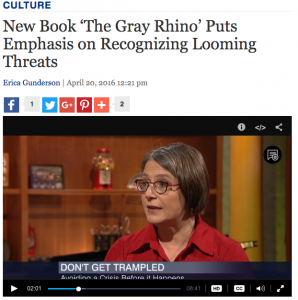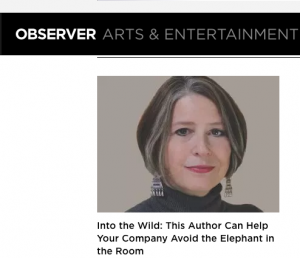 One of the things I’m enjoying the most about the launch of The Gray Rhino: How to Recognize and Act on the Obvious Dangers We Ignore is the way people are embracing the concept and applying it to their work, to their personal lives, and to the policy challenges facing their communities and the planet. We all face highly obvious gray rhino threats, and we all could do better -often MUCH better- at dealing with instead of denying them.
One of the things I’m enjoying the most about the launch of The Gray Rhino: How to Recognize and Act on the Obvious Dangers We Ignore is the way people are embracing the concept and applying it to their work, to their personal lives, and to the policy challenges facing their communities and the planet. We all face highly obvious gray rhino threats, and we all could do better -often MUCH better- at dealing with instead of denying them.
In recent workshops in Milwaukee, Phoenix, and San Francisco, I enjoyed and learned from lively discussions about gray rhinos from transportation and workforce challenges to family financial planning; to geo-economic issues like China’s economy, the clashing threats of deflation and asset inflation, the impact of volatile oil prices on the Middle East and on the global economy; the impact of disruptive technologies on various industries and the employment outlook; safety and transparency problems that now look to be widespread across the auto industry, not just isolated to a couple of companies; and ongoing business issues like evolving customer preferences and cost of customer acquisition. I loved that one workshop group even came up with a new term: limping hippos -for the things that appear to be gray rhinos but turn out to be false alarms.
Scott MacDonald of the University of Connecticut has written on LinkedIn Pulse about Puerto Rico’s debt crisis as a gray rhino: “International financial markets have already seen the problem of a slow motion train wreck with Greece’s debt problem and the European Union; hopefully we are not going to relive it with Puerto Rico and the U.S. municipal bond market. More likely than not, a portion of Puerto Rican debt will have to be written off.”
Regina Rodriguez-Martin wrote on her Chicana on the Edge blog about how we can apply gray rhinos to personal life, not just to business and policy issues. “The ending of my marriage was probably a gray rhino,” she says. I often mention Regina’s quip at book talks and the audiences just love her perspective. On another serious note, she mentions a friend whose mother was dying, but her father only got past the denial stage when she passed away.
Dr. Aldemaro Romero Jr wrote “Academia is now facing a lot of gray rhinos,” in the Edwardsville Intelligencer. He cites the vulnerability of state educational institutions to falling funding and of private institutions to challenges involving diversity, access and endowment management. Students and parents can add to problems when they let a sense of entitlement get in the way.
In Norway, leadership consultant Lise Strand Bjarkli uses the gray rhino to talk about how businesses face market disruptions including the Fourth Industrial Revolution and “the awareness, willingness and ability each and one of us could summon to act upon swans, elephants or grey rhinos.”
A reader who emailed me this week feels that nuclear weapons are an important gray rhino, a conclusion that many respondents to the World Economic Forum’s 2016 Global Risks Report certainly shared.
Questions from audiences and readers always give me lots of food for thought. One of the first questions I nearly always get is whether Donald Trump is a gray rhino. (Look at all of the failed attempts to stop his rise; more important, though, is to look at the gray rhinos that made it possible.) What about the “Really Big One” earthquake along the Cascadian subduction zone, the subject of a Pulitzer Prize winning New Yorker article? (Highly scientific consensus: the really big one most likely is a black swan in our lifetime, but likely a gray rhino in the future; and smaller quakes are definitely gray rhinos.) The asteroid Apophis or other asteroids that might strike earth? (NASA scientists see the risk as extremely low, though several recent news articles have placed it higher.) Our polarized and paralyzed political system? A resounding YES.
That’s the great thing about the gray rhino concept: not every person may see the same gray rhinos, but the principle and framework can help everyone to take a more serious look at the things right in front of us that we don’t give the attention that they deserve.
So, I ask today: What is your gray rhino? I’d love to hear about it.
Read and share this post on LinkedIn Pulse.
 The best companies are the ones that see opportunity in adversity, and are always willing to change. Applying the gray rhino concept to the challenges facing start-ups –or any companies, for that matter– I penned this piece for Inc.: “3 Questions to Make Sure Your Startup Can Thrive With Change”
The best companies are the ones that see opportunity in adversity, and are always willing to change. Applying the gray rhino concept to the challenges facing start-ups –or any companies, for that matter– I penned this piece for Inc.: “3 Questions to Make Sure Your Startup Can Thrive With Change”
 One of the things I’m enjoying the most about the launch of
One of the things I’m enjoying the most about the launch of  C-Span2 BookTV broadcast
C-Span2 BookTV broadcast I appeared on
I appeared on 
